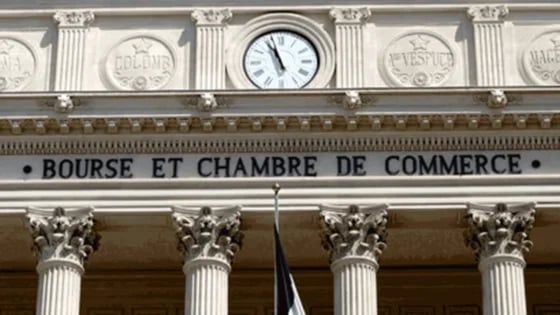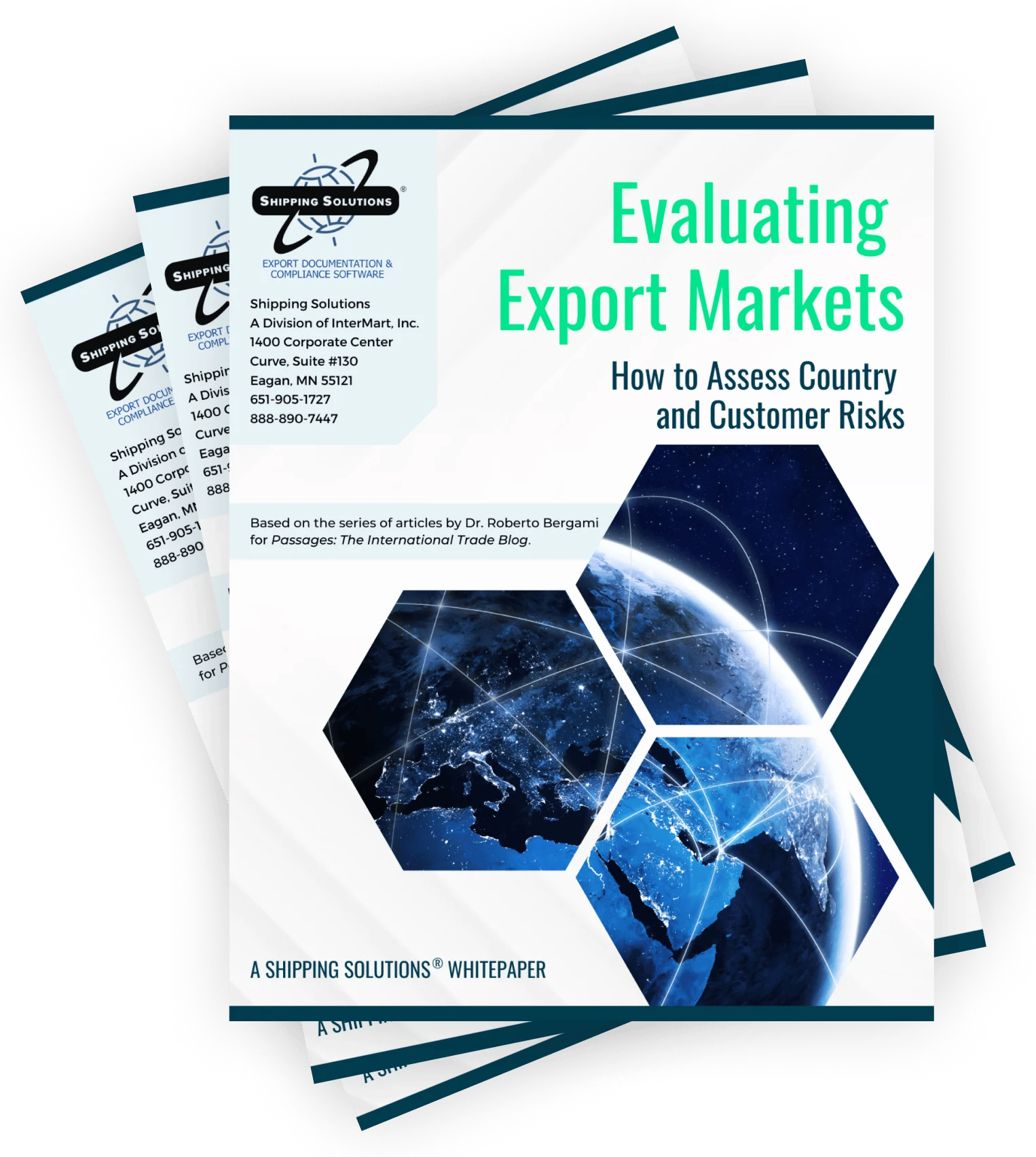The International Trade Blog International Sales & Marketing
How to Use Chambers of Commerce and Trade Consulates to Minimize International Trade Risk
On: December 13, 2023 | By:  Roberto Bergami |
5 min. read
Roberto Bergami |
5 min. read
 This is the eighth part in my series of articles on assessing risk in international trade. In my last article of this series, I discussed the role banks play in international trade and how to measure the risk associated with certain banks and bank programs.
This is the eighth part in my series of articles on assessing risk in international trade. In my last article of this series, I discussed the role banks play in international trade and how to measure the risk associated with certain banks and bank programs.
In this article, I will focus on the role of chambers of commerce and trade consulates in importing and exporting.
The Role of Chambers of Commerce and Trade Consulates
Chambers of commerce are typically private organizations representing a category of industry sectors and working for the benefit of their membership. Chambers of commerce may be quite broad in their activities or very specifically focused; it depends on their charter.
A trade consulate or attaché is typically the commercial arm of a foreign embassy, high commission or consulate. They are a public body of a foreign government and, as such, they follow a different agenda than the chambers of commerce. Since they are a public institution, they are subject to their current government policies and typically only serve the commercial interests of organizations from their country.
Both chambers of commerce and trade consulates have roles in common such as networking and business-matching functions. They can put people in touch with each other and also find sellers and suppliers to assist in business generation.
Probably the best thing about working with these bodies is that they already have a network of industry contacts that have been filtered to varying degrees. This accelerates your efforts in finding a potential seller or buyer. As we all know, time is critical in business.
It is also possible to do personal networking at the local level by attending the functions these bodies host. They may be market-specific or industry-sector-specific functions. In either case, they provide an opportunity for people to meet like-minded individuals with a real or potential interest in doing business in countries X, Y or Z in industries A, B or C.
Attendees may obtain interesting and useful information during these meetings, including third-party referrals, swapping stories about who is doing what to whom, and who are the bad guys. This is all valuable information, especially for the novice in a new area.
This information-gathering assists in creating a mental picture of a foreign industry sector and its business environment. Much can be learned in a few hours about what works and does not work. This information comes at a low cost but has high value.
Documentation, Trade Missions and Business-Matching
Chambers of commerce also offer documentation services, including the legalization of documents and issuance of certificates of origin. They are also able to offer comments about further legalization processes, such as consular legalizations, etc. This is useful operational information that may impact the ability to service a foreign customer in accordance with the contract specifications for documentation.
Chambers also offer the opportunity to participate in trade missions. These usually take the form of country and/or industry-specific visits. The chamber conducts a matching exercise between buyers and sellers on the mission ahead of the visit with a view to organizing in-country meetings with the foreign counterparts.
Trade consulates also offer business-matching opportunities, and the organizations in their databases have usually been the subject of previous inquiry to ascertain export readiness and capability. After all, there is little point in matching someone with a counterpart that is likely to be a failure at the onset.
Trade consulates also have reputations to protect: their own and that of their ministry and country. They have no interest in doing anything except what is the best possible. Consequently, contacts from these organizations are comparatively lower risk.
Trade consulates also offer some tailored consultancy services. These vary widely in their availability, scope, depth and cost from one diplomatic post to another and from country-to-country.
Typically a local consultancy firm familiar with the trade consulate would be engaged to provide specific advice. This may vary from a general market analysis to options for selecting agents or distributors in a particular market, to the provision of a specific market report, or anything else that you may desire.
The benefits of pursing this option is that the consultancy service is generally quite reliable and produces good reports. Any consultant has already been filtered by the trade consulate and is likely to be a respectable service.
A Lesson Learned: Check the Consultant's Credentials
On this score, I am reminded of a past attempt by a consultant to provide some specific in-market information about a country in the Middle East that I was interested in selling to. This consultant's claim to fame was that he was originally from that country, was quite well-versed in the business culture and etiquette, and had previous extensive working experience in that country in a marketing capacity.
I had not been able to find anyone else to complete that task at the time. The consultant was given a written brief on the information required and was engaged to provide this in exchange for a payment of $15,000. He returned six weeks later and produced his report with an invoice.
Unfortunately, his invoice was never paid. This is not because I am a rogue, but it was because of the type of report he produced. I am being generous with the use of the word report. Basically what he provided me with was a country profile that was extracted from some encyclopedia-like resource. It provided me with the structure of the government, the type of legal system, latitude, longitude, population numbers, average seasonal temperatures, annual rainfall, public holidays and main local foods—not much else. Sure it was in color, nicely bound, but no details about the specific information I was seeking—what a waste of six weeks' worth of waiting!
Of course, he did demand payment, but once he was referred back to the written brief and his lack of performance, he was never seen again. By the way, the report was handed back to him immediately; one less reason to want to claim any remuneration for the job.
What is the moral of the story? Make sure you have written briefs for consultants. They protect both you and them. Also, make sure that you check out the credentials of the consultant as much as you can beforehand. It is about reducing your risk after all.
In Conclusion
In summary, the advantages of using chambers of commerce and trade consulates are that you potentially get access to a wide variety of reliable information that should enable you to positively accelerate your business activities in international markets. Some of this information is free, and some of it has to be customized to your needs. In my experience, whether or not the information obtained from these sources is free, it has always been worthwhile.
Using respectable sources of information not only accelerates your processes but also reduces risks. Networking with others may be of great help in avoiding picking bad apples as partners; this way you will reduce risk. It may be that you will not get details about a business counterpart opportunity abroad, but you may well get details of which organizations you should avoid—typically these organizations and individuals have a track record—and that is very valuable information indeed.
In my next article, I will focus on some aspects of international market access issues.
Like what you read? Subscribe today to the International Trade Blog to get the latest news and tips for exporters and importers delivered to your inbox.
This article was first published in April 2014 and has been updated to include current information, links and formatting.

About the Author: Roberto Bergami
A full time member of staff at Victoria University, Melbourne, Australia, since 1998, Roberto holds a PhD (Thesis title Risk Management in Australian Manufacturing Exports: the Case of Letter of Credit to ASEAN), a Master in Education and Master of Business by Research (Applied Economics). Roberto additionally holds the Certified Documentary Credit Specialist qualification.
He is currently a Senior Lecturer in the College of Business and Visiting Professor at the University of South Bohemia in Ceske Budejovice, the Czech Republic. Roberto is also an Associate Researcher of the Centre for Cultural Diversity and Wellbeing and the Centre for Strategic and Economic Studies. Roberto has maintained his involvement with industry through a number of peak associations where he enjoys various grades of senior level membership.
Roberto’s main areas of research interests in international trade focus on government regulations, delivery terms (Incoterms), international payment terms and market entry barriers. His other research interests include the development of communities of practice, online teaching and online communities, migration from Emilia-Romagna (Italy) to Australia and teenage/youth dialect.




